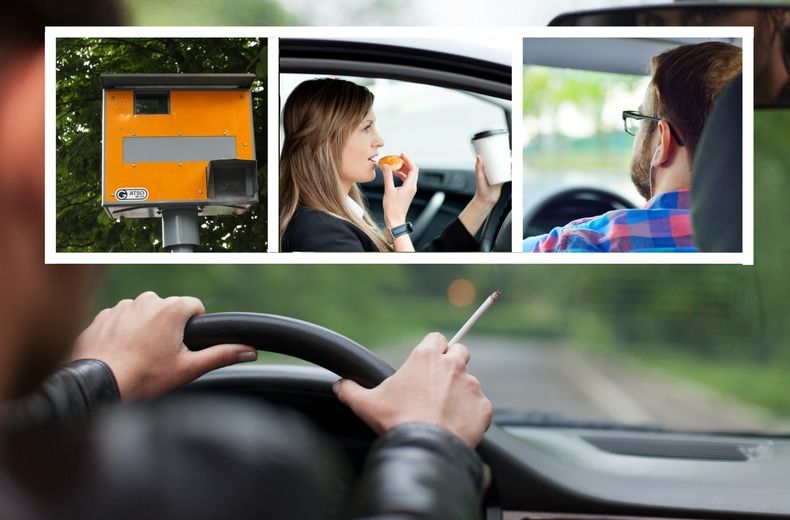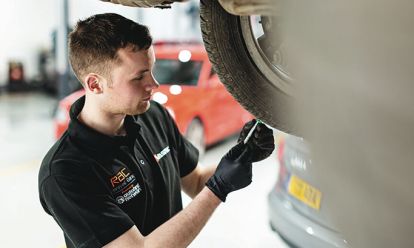To help you sort the driving laws from the fake news, we’ve put together some definitive answers to a few of the most common motoring questions out there in this know how guide.
These are not just for learner drivers!
1. Is it illegal to eat and drive?
No, it’s not illegal to eat while driving.
However, if you get distracted while snacking behind the wheel, the police could prosecute you for careless driving if they consider you to not be in proper control of the vehicle, an offence which carries an on-the-spot fine of £100 and three penalty points.
2. Is it illegal to drink when driving?
Just like eating behind the wheel, taking a swig of water or coffee while you’re driving is not illegal, but it could carry the same careless driving penalty if you’re accused of being distracted.
Dehydration can cause a loss of focus and lead to drowsiness and slower reaction times. So, drinking is allowed.
If you’re heading off on a long journey, particularly in hot weather, keep dehydration at bay by carrying a bottle of water in your car.
3. Is it illegal to smoke and drive?
Smoking while driving itself is not illegal, but just like eating and drinking, if it causes distraction behind the wheel you could face a charge of careless driving.
If you’re travelling with passengers aged under 18 though, it is illegal to smoke in the car. Changes were made to the law in 2015 to protect children from second-hand smoke.
It is important to remember, drivers could be fined up to £50 if they fail to prevent smoking in a car with a child under 18 as a passenger, and up to £200 if prosecuted in court.

RAC sale – up to 33% off*
• Roadside cover from £5.29 a month†
• We get to most breakdowns in 60 mins or less
• Our patrols fix 4/5 breakdowns on the spot

4. Is it illegal to have a light on in a car while driving?
There’s no law against driving with interior lights on, but if a police officer decides your interior light is a driving distraction they could ask you to turn it off, or even charge you with careless driving.
And it doesn’t have to be a distraction for you, either.
If the light is judged to be dazzling or distracting to other road users, particularly those driving behind you, you may also be charged by the police.
5. Is it illegal to have open alcohol in a car?
No. Although driving while over the limit is incredibly dangerous and against the law it’s not illegal to drink alcohol at the wheel, so by default it’s not illegal to have open alcohol containers in the car.
The main alcohol law to remember is the UK drink-driving law, which states you can only drive if you are under the national drink-drive limit, or else face heavy fines and a driving ban.
READ MORE: Drink driving statistics
6. Is it illegal to drive with headphones on?
While there is no specific law that clearly states it’s not legal to drive while wearing headphones, it is highly unadvisable because it can be dangerous.
Not only could it see you charged with dangerous driving, loud music could also stop you from hearing emergency vehicle sirens, level crossing warnings, other road users and pedestrians approaching your vehicle.
If a police officer believes you are driving without due care, you could be prosecuted under the Road Traffic Act 1988.
7. Is it illegal to make a phone call using a hands-free system?
Drivers can make a phone call while driving if they use a hands-free kit or their car’s Bluetooth system.
Current laws ban drivers from holding their phones if they are using them for interactive communication functions, such as making a call or typing a text.
Using a hand-held mobile phone while driving is illegal, punishable by six points on your licence and a £200 fine.
Any hands-free devices should be fully set up before you drive, so you can take calls without handling the device.
The police still have the power to stop you if they believe you have been distracted by using a mobile phone while driving, even if it’s fully hands-free.
Temporary Car Insurance
Get short term insurance from 1 hour to 30 days. It’s quick! Get covered within 15 minutes. Buy online 24/7.
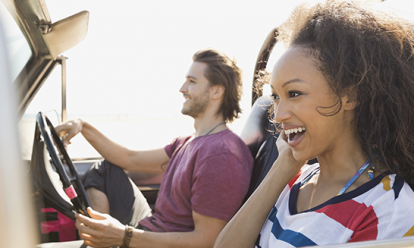

8. Is it illegal to use a sat-nav whilst driving?
Sat-navs – whether you are using a separate device or an app on your phone – should be fixed in a set position, either on your windscreen or dashboard. We recommend a phone holder attached to your dashboard, so your view isn't impeded.
Just like with handheld phones, you should not interfere with your phone when you’re using it as your sat-nav while driving, because it could lead to six penalty points and a £200 fine if caught.
9. If a speed camera doesn’t flash does it mean I’ve not been caught?
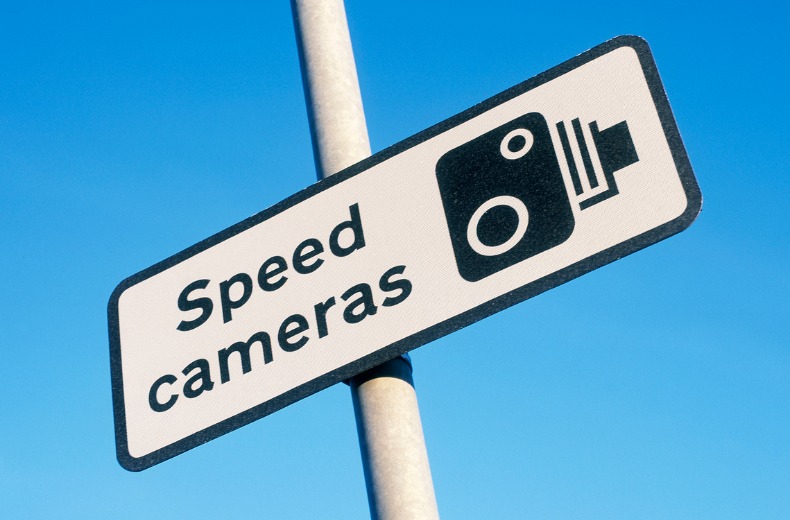
The short answer is no.
There are many different variations of speed camera, but only the Gatso type flash to take a picture of you speeding. Others catch you by using infra-red light.
While speed limits may vary from one road to the next, there is only one proven method to make sure you don’t get caught speeding: always know the speed limit of the road you’re on and stick to it.
10. Are you allowed to drive 10% over the speed limit?
No. While many vehicles’ speedometers allow a 10% overestimation error, this allowance doesn’t exist on speed cameras. You can’t drive at 33mph in a 30mph zone, for example.
Simply put, if a police officer catches you with a mobile radar speed gun exceeding the limit, you are liable for prosecution even at 1mph over the limit.
The National Police Chiefs’ Council (NPCC) suggests police forces don’t prosecute until drivers exceed a margin of error of 10% of the speed limit, to take into account driver concentration, plus 2mph for speedometer error.
But this is only a suggestion, not a rule, and the NPCC don’t enforce the law – it’s down to the discretion of the police officer in question.
11. How many drinks can I have and still drive?
It’s a common myth that drivers can have ‘a pint or two’ or a large glass of wine and still be safe to drive afterwards.
Your blood-alcohol level actually depends on many factors other than the alcoholic drinks you consume – whether you’ve eaten or exercised, how tired you are, or if you’re taking any medication can all affect how your body processes the alcohol.
There are many factors to consider – it’s not a cut-and-dry rule.
The best advice is not to drink any alcohol at all.
12. Does my fully-comprehensive insurance policy cover me to drive other cars?
That depends on your car insurance policy. It used to be the case that many policies came with ‘driving other cars’ (DOC) cover included as standard.
These days, this is less common and will often only be included if the driver asks for it and pays extra.
Drivers under 25 are unlikely to have this cover on any policy.
Even if you do have DOC cover, it’s only supposed to be used in an emergency, which means your provider might not pay out if you’re involved in a collision and don’t have a good reason to be driving someone else’s car.
To be sure of your specific cover, check your insurance policy to see what cars you can and cannot drive.
If you need to drive another car, be that to borrow it or share the driving on a long trip, you can purchase a specific temporary car insurance policy to cover you for this. It can be applied for easily online for as little as an hour up to 30 days. If you need more, you can either top up or buy a new policy. If you need to make a claim, it won’t affect the owner’s No Claims Discount.
With RAC breakdown, our personal-based cover will protect you across multiple vehicles. Business breakdown can cover your whole fleet if you're a business owner.
13. Can I leave my engine running while parked up?
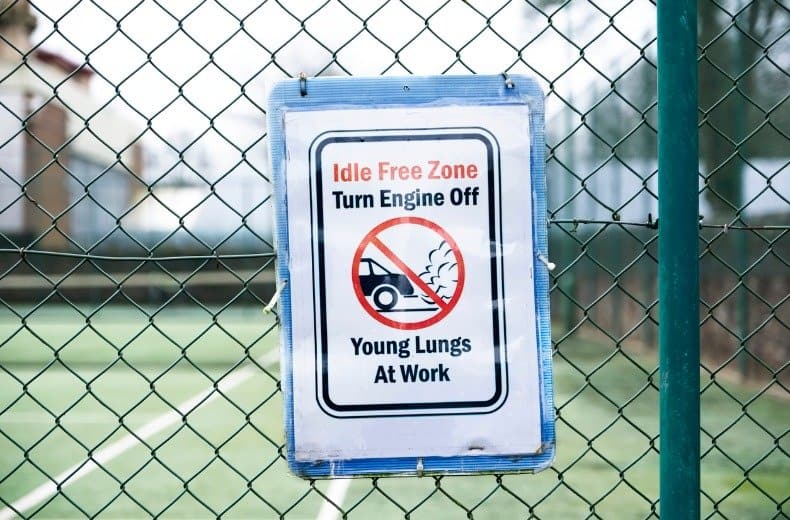
Leaving your engine running while parked up, or engine idling as it’s otherwise known, could see you land a fixed penalty.
Rule 123 of The Highway Code says that drivers must not leave a vehicle engine running unnecessarily while that vehicle is stationary on a public road.
14. Is supermarket fuel bad for my engine?
No.
All fuels sold in the UK have to meet the same British Standards.
Although supermarket fuel wouldn’t damage your car or be under par, it typically contains less performance additives than branded fuel.
These include detergents to remove the build-up of deposits in the engine and lubricant to reduce wear and tear.
‘Super’ fuels usually contain greater amounts of the additives.
15. Can I change lanes to trick average speed cameras?
Older average speed cameras may have been fooled by simply changing lanes, but times have changed.
Today, the cameras calculate for lane changes and take pictures of every lane to cross-compare them.
16. Is it illegal to use my phone in my car tracking my mileage?
No, as long as you don’t touch them. Any apps tracking your mileage or usage for a Black Box Car Insurance policy shouldn’t need you to interact with them while you’re driving.
You simply need to have them running on your phone. Remember, it is illegal to hold a phone or sat nav while driving. You must have hands-free access.
17. Can I break the speed limit when overtaking?
No.
Although overtaking manoeuvres should be completed quickly and safely, you should never break the speed limit for the road you’re driving on.
As tempting as it might be to speed past middle lane hoggers on the motorway, you should wait for a safer opportunity to pass irresponsible drivers.

RAC sale – up to 33% off*
• Roadside cover from £5.29 a month†
• We get to most breakdowns in 60 mins or less
• Our patrols fix 4/5 breakdowns on the spot

18. Is there such a thing as driving too slowly?
The police can pull you over and charge you with careless driving if they decide your speed is inappropriate for the road you’re driving on.
Some roads will display a minimum speed sign to give you a clear idea of how fast you should be driving.
You’re most likely to come across the blue circular signs in and around tunnels. Some of the signs display a red horizontal to show the end of the minimum speed limit.
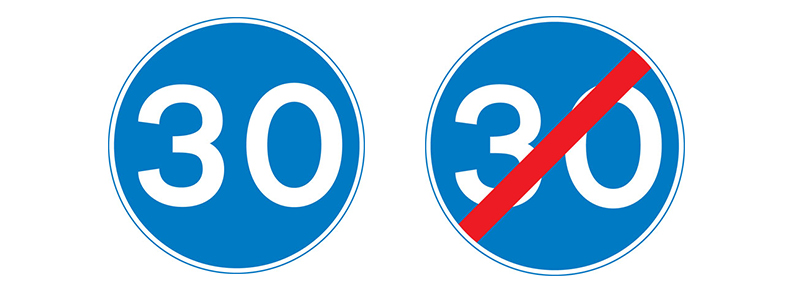
19. Can you get in trouble for splashing a pedestrian with a puddle?
Yes.
If a police officer catches you splashing someone at the side of the road you might be charged with ‘driving without due care and attention or without reasonable consideration for other road users.’
Breaking the rule could land you with 3 to 9 penalty points added to your licence for 4 years.

